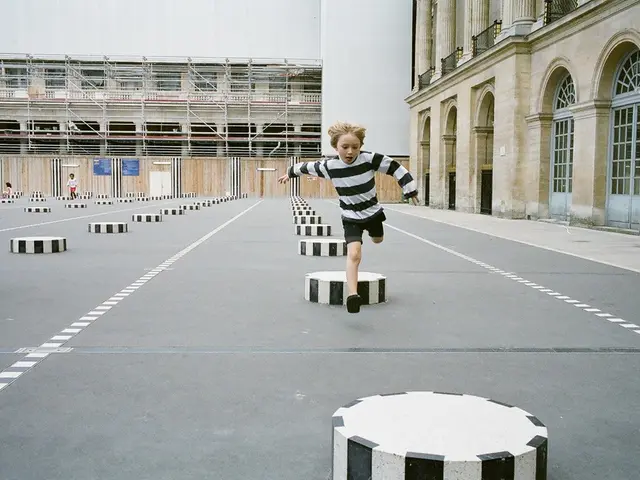Investigating the Psychological Effects of Simple, Streamlined Living Spaces
## Simplifying Life, Enhancing Minds: The Power of Minimalism
In the pursuit of a healthier, more balanced life, minimalism—the practice of intentionally paring down possessions and commitments—has emerged as a powerful tool for cognitive health and overall well-being. By creating decluttered environments and streamlined lives, minimalism offers numerous benefits for focus, stress reduction, memory, and mental health.
### Focus and Productivity
Minimalist environments, devoid of visual and physical clutter, provide a sanctuary for concentration[1][3]. With fewer possessions and obligations, individuals often find it easier to prioritize tasks and work more efficiently, as the mental burden of managing excess is alleviated[1]. This newfound clarity allows for a deeper engagement with meaningful activities, potentially boosting productivity and cognitive performance.
### Stress Reduction
Clutter, both physical and metaphorical, is a known contributor to stress and anxiety[1][3]. By decluttering physical spaces and simplifying daily routines, individuals can cultivate calmer, more soothing environments, leading to a decrease in stress levels[1][3]. This reduction in stress is not only beneficial for emotional well-being but also for cognitive function, as chronic stress has been linked to memory impairment and cognitive decline[4].
### Memory and Cognitive Clarity
A simplified lifestyle may indirectly support memory and cognitive clarity by reducing cognitive load—the mental effort required to navigate complex environments or schedules. Fewer distractions and obligations mean less cognitive "bandwidth" is spent on non-essential tasks, freeing up mental resources for more important cognitive functions[3]. For aging adults, maintaining cognitive clarity is closely tied to independence and confidence in daily activities[4].
### Overall Mental Health
Minimalism encourages a focus on what truly matters, often leading to increased time for self-care, creative pursuits, and mindfulness practices[3]. This can foster a greater sense of presence, gratitude, and emotional resilience, all of which are foundational for mental health[3]. Over the long term, these habits may contribute to improved mood stability, anxiety management, and emotional regulation[2].
## Mechanisms Linking Minimalism and Cognitive Health
- **Reduced Cognitive Load:** Fewer possessions and commitments decrease the mental effort needed to manage life, enhancing focus and freeing cognitive resources for higher-order thinking. - **Enhanced Emotional Regulation:** Lower stress levels and increased mental clarity support better emotional processing and resilience[1][2]. - **Improved Self-Care Opportunities:** With more time and fewer distractions, individuals are better positioned to engage in activities that support physical and mental health, such as exercise, meditation, and adequate rest[3][4]. - **Positive Feedback Loops:** As cognitive and emotional well-being improve, individuals may find it easier to maintain minimalist habits, creating a virtuous cycle of continued mental health benefits[2].
## Summary Table: Cognitive Implications of Minimalist Living
| Aspect | Minimalist Living Effect | Cognitive Benefit | |-----------------------|----------------------------------------------|----------------------------------------| | Focus | Fewer distractions, simplified tasks | Improved concentration, productivity | | Stress | Less clutter, reduced obligations | Lower anxiety, calmer mindset | | Memory | Reduced cognitive load | Enhanced clarity, better recall | | Mental Health | More time for self-care, presence | Greater resilience, emotional balance |
## Conclusion
Minimalist living, through the intentional simplification of physical and mental landscapes, can lead to enhanced focus, reduced stress, improved memory, and better overall mental health. These changes arise from decreased cognitive load, greater emotional regulation, and increased opportunities for self-care and mindfulness[1][2][3]. While individual experiences may vary, the cognitive and psychological benefits of minimalism are increasingly recognized as complementary to evidence-based wellness practices[2][4].
Minimalism plays a significant role in improving both short-term and long-term memory capabilities. It's not just about design aesthetics; it's a lifestyle that seeks freedom and fulfillment in simplicity. Minimalist living fosters a deeper connection with the present moment. It enhances overall mental focus and attention to detail. Minimalism goes beyond decluttering; it's a mindset that prioritizes value, meaning, and joy in life by eliminating the superfluous. Minimalist living is a philosophy that promotes living with less to enjoy more of life's true value. Cognitive load theory explains how minimalism reduces extraneous cognitive load, optimizing memory function and learning efficiency.
- In a minimalist environment, the absence of visual and physical clutter allows for superior focus, particularly in tasks that require concentration.
- By simplifying daily routines, minimalism contributes to stress reduction, leading to a decrease in overall stress levels.
- The reduction in stress, in turn, enhances cognitive function, improving memory and cognitive clarity.
- Minimalism encourages a mindfulness approach to life, promoting a greater sense of presence, gratitude, and emotional resilience, which are essential for maintaining mental health.
- Over time, these habits may lead to improved mood stability, better anxiety management, and emotional regulation.
- A reduced cognitive load, a result of fewer possessions and commitments, enables increased mental resources for higher-order thinking and problem-solving.
- Enhanced emotional regulation in minimalist living creates better opportunities for self-care, such as exercise, meditation, and adequate rest, which support both physical and mental health.
- Positive feedback loops may be established, where cognitive and emotional well-being improvements support the continuation of minimalist habits, further benefiting mental health.
- Cognitive load theory explains that minimalism optimizes memory function and learning efficiency by decreasing the extraneous cognitive load, fostering a deeper connection with the present moment and learning experiences.




